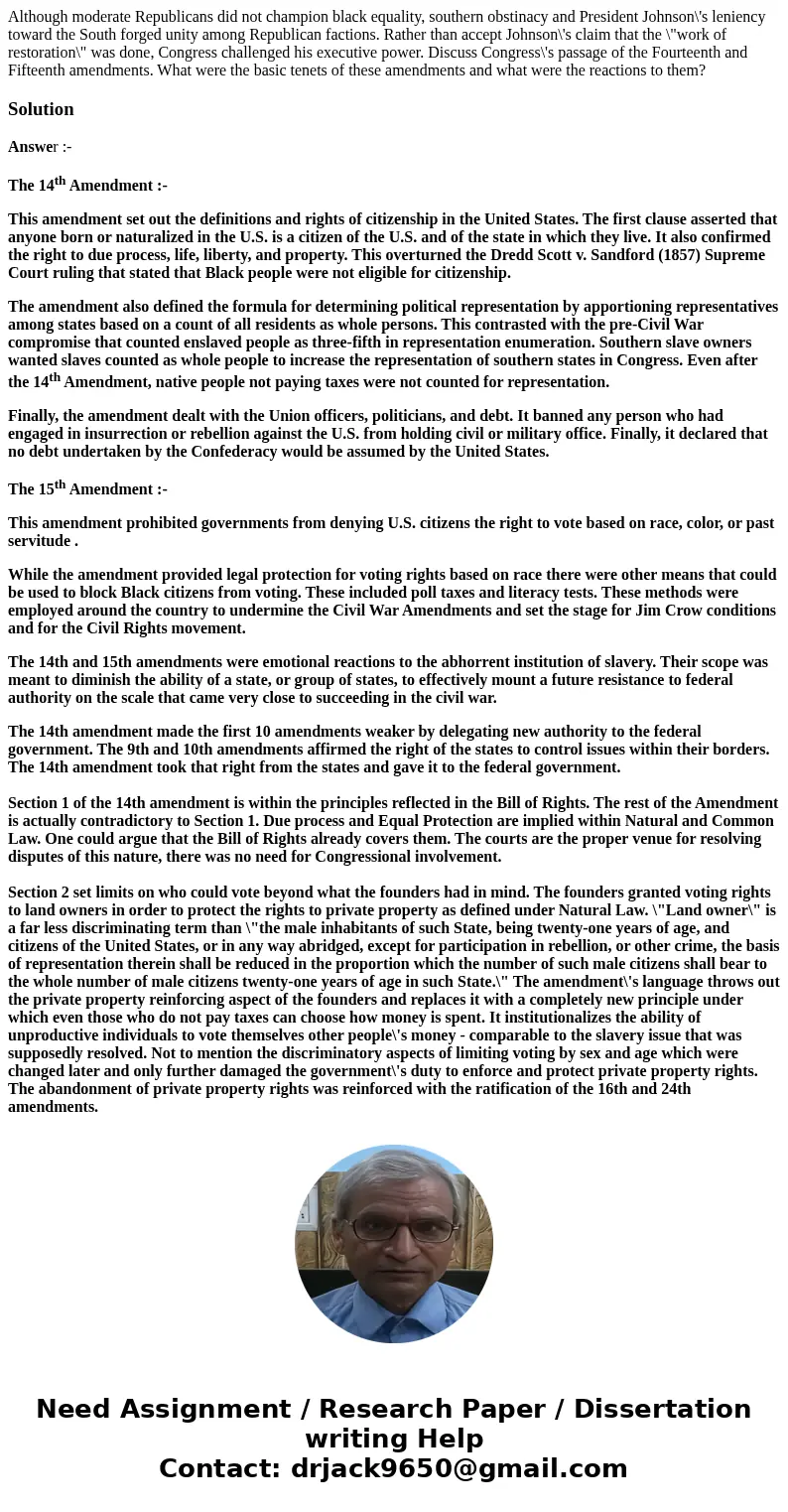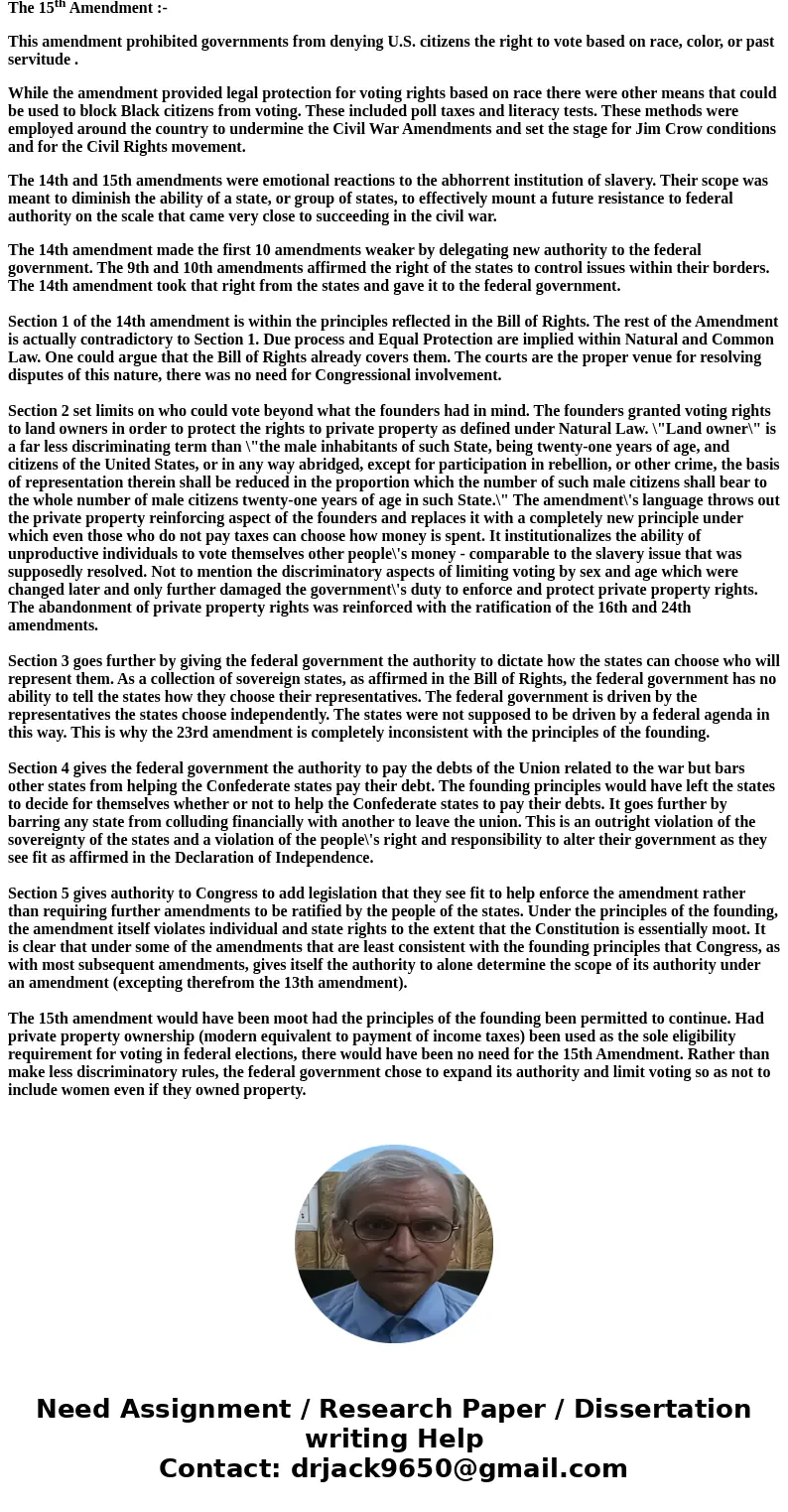Although moderate Republicans did not champion black equalit
Although moderate Republicans did not champion black equality, southern obstinacy and President Johnson\'s leniency toward the South forged unity among Republican factions. Rather than accept Johnson\'s claim that the \"work of restoration\" was done, Congress challenged his executive power. Discuss Congress\'s passage of the Fourteenth and Fifteenth amendments. What were the basic tenets of these amendments and what were the reactions to them?
Solution
Answer :-
The 14th Amendment :-
This amendment set out the definitions and rights of citizenship in the United States. The first clause asserted that anyone born or naturalized in the U.S. is a citizen of the U.S. and of the state in which they live. It also confirmed the right to due process, life, liberty, and property. This overturned the Dredd Scott v. Sandford (1857) Supreme Court ruling that stated that Black people were not eligible for citizenship.
The amendment also defined the formula for determining political representation by apportioning representatives among states based on a count of all residents as whole persons. This contrasted with the pre-Civil War compromise that counted enslaved people as three-fifth in representation enumeration. Southern slave owners wanted slaves counted as whole people to increase the representation of southern states in Congress. Even after the 14th Amendment, native people not paying taxes were not counted for representation.
Finally, the amendment dealt with the Union officers, politicians, and debt. It banned any person who had engaged in insurrection or rebellion against the U.S. from holding civil or military office. Finally, it declared that no debt undertaken by the Confederacy would be assumed by the United States.
The 15th Amendment :-
This amendment prohibited governments from denying U.S. citizens the right to vote based on race, color, or past servitude .
While the amendment provided legal protection for voting rights based on race there were other means that could be used to block Black citizens from voting. These included poll taxes and literacy tests. These methods were employed around the country to undermine the Civil War Amendments and set the stage for Jim Crow conditions and for the Civil Rights movement.
The 14th and 15th amendments were emotional reactions to the abhorrent institution of slavery. Their scope was meant to diminish the ability of a state, or group of states, to effectively mount a future resistance to federal authority on the scale that came very close to succeeding in the civil war.
The 14th amendment made the first 10 amendments weaker by delegating new authority to the federal government. The 9th and 10th amendments affirmed the right of the states to control issues within their borders. The 14th amendment took that right from the states and gave it to the federal government.
Section 1 of the 14th amendment is within the principles reflected in the Bill of Rights. The rest of the Amendment is actually contradictory to Section 1. Due process and Equal Protection are implied within Natural and Common Law. One could argue that the Bill of Rights already covers them. The courts are the proper venue for resolving disputes of this nature, there was no need for Congressional involvement.
Section 2 set limits on who could vote beyond what the founders had in mind. The founders granted voting rights to land owners in order to protect the rights to private property as defined under Natural Law. \"Land owner\" is a far less discriminating term than \"the male inhabitants of such State, being twenty-one years of age, and citizens of the United States, or in any way abridged, except for participation in rebellion, or other crime, the basis of representation therein shall be reduced in the proportion which the number of such male citizens shall bear to the whole number of male citizens twenty-one years of age in such State.\" The amendment\'s language throws out the private property reinforcing aspect of the founders and replaces it with a completely new principle under which even those who do not pay taxes can choose how money is spent. It institutionalizes the ability of unproductive individuals to vote themselves other people\'s money - comparable to the slavery issue that was supposedly resolved. Not to mention the discriminatory aspects of limiting voting by sex and age which were changed later and only further damaged the government\'s duty to enforce and protect private property rights. The abandonment of private property rights was reinforced with the ratification of the 16th and 24th amendments.
Section 3 goes further by giving the federal government the authority to dictate how the states can choose who will represent them. As a collection of sovereign states, as affirmed in the Bill of Rights, the federal government has no ability to tell the states how they choose their representatives. The federal government is driven by the representatives the states choose independently. The states were not supposed to be driven by a federal agenda in this way. This is why the 23rd amendment is completely inconsistent with the principles of the founding.
Section 4 gives the federal government the authority to pay the debts of the Union related to the war but bars other states from helping the Confederate states pay their debt. The founding principles would have left the states to decide for themselves whether or not to help the Confederate states to pay their debts. It goes further by barring any state from colluding financially with another to leave the union. This is an outright violation of the sovereignty of the states and a violation of the people\'s right and responsibility to alter their government as they see fit as affirmed in the Declaration of Independence.
Section 5 gives authority to Congress to add legislation that they see fit to help enforce the amendment rather than requiring further amendments to be ratified by the people of the states. Under the principles of the founding, the amendment itself violates individual and state rights to the extent that the Constitution is essentially moot. It is clear that under some of the amendments that are least consistent with the founding principles that Congress, as with most subsequent amendments, gives itself the authority to alone determine the scope of its authority under an amendment (excepting therefrom the 13th amendment).
The 15th amendment would have been moot had the principles of the founding been permitted to continue. Had private property ownership (modern equivalent to payment of income taxes) been used as the sole eligibility requirement for voting in federal elections, there would have been no need for the 15th Amendment. Rather than make less discriminatory rules, the federal government chose to expand its authority and limit voting so as not to include women even if they owned property.


 Homework Sourse
Homework Sourse